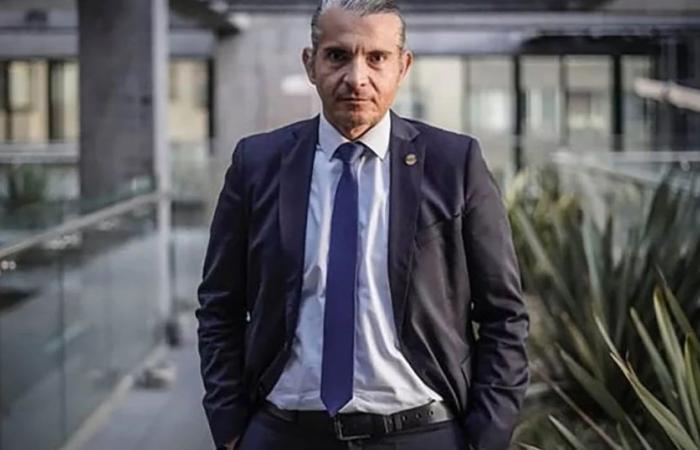(From Santiago, Chile) assumed in October last year and his name quickly began to make headlines: baptized as the new “anti-drug czar” Juan Castro BekiosProsecutor of Antofagasta, in solo five months unwary 13 tons of drugs and in one week he dealt three blows to organized crime. The icing on the cake? The seizure just a few days ago of almost 4 liters of fentanylthe largest seizure of the call “zombie drug”” that is registered in Chile.
His numbers are surprising: in early June, he caught a gang red-handed trafficked cigarettes on the border with Bolivia, confiscating a shipment valued at $200 million (USD 214 mi). And that same month he destroyed “The Aunts”, dangerous and former drug group which was directed by two women of Chilean nationality, in coordination with children, husbands and relatives, in the city of Calama (1,530 km north of Santiago).
Thanks to this, the Antofagasta Prosecutor’s Office that he directs managed to seize a total of 13 tons of drugs in five months, which is equivalent to 40% of all narcotics seized in the country so far this year.
In an interview with the media El Desconcimiento, Castro Bekios explained that the key to his work has been to attack organized crime from the perspective of a “holding of crime”“, true “companies” who profit from any illicit activity that generates money such as drug trafficcigarette smuggling, extortive kidnappingwhite slavery or van theft which are usually exchanged for drugs on the border with Bolivia. These organizations use various tools to launder their profits, setting up businesses “facade”, opening accounts and sending money abroad and even buying cryptocurrencies.
According to the pursuer, the region of Antofagasta (1,300 km north of Santiago), has become the “natural frontier” for criminal groups that seek to bring drugs or other illicit products into the country, since the region shares 150 kilometers of border with Bolivia.
“Remembering the different telephone interceptions, for criminal organizations the first major objective is to move to Antofagasta. Passing Antofagasta they know that the possibilities to detect them They are very low,” he assured.
“The analysis is that there are several elements that come together in the criminal reality that is happening in the Northern Macrozone, but especially in the Antofagasta region. a sort of bottleneck where different criminal phenomena converge in the same place. That is what is happening in the second region,” he explained.
These organizations have made strong in the various irregular camps that there are in the region – called “tomas” -, populated in a 87% by migrants who live in extreme poverty.
“Before they were fundamentally organizations of origin Colombian, now with new members of Venezuelan origin in Antofagasta and Calama. They operate in the same way, that is, exercising territorial control, which means exercising violence, intimidating the people who live in the camps, charging them for all the services that exist, taxes or ‘vaccinations’ for any type of legal activity. or illegal that is carried out inside the camps,” said the prosecutor.
According to the pursuer, it is essential that the State take charge of the problem of “takings”, since even if the police manage to break up a ganganother group will take their place at Little time.
“It has to be a State policy where all State bodies intervene, but it must also be a medium and long-term policy, because the camps It is not a situation that can be solved in short term, it is impossible. With the shortage of housing in the Antofagasta region, given also the cost they have, it is impossible to take care of it,” he warned.
Last week, various raids carried out by the police in Antofagasta ended with the largest seizure ever made of fentanyl in Chile: the operation allowed the seizure 1,195 ampoules of the “zombie drug” – almost four liters –in addition to marijuana, cocaine and base paste.
“We have no record of another seizure like this,” Castro Bekios said exultantly at the time.
Responsible for numerous deaths in USAwhere it is considered a epidemic, Fentanyl is a drug 50 times more powerful than heroin and up to 125 times stronger than morphine. Last year in Chile there were two seizures of this drug, but the police are on alert since its presence has begun to be detected with greater frequency.
The fentanyl route is dominated by cartels Jalisco and Sinaloa in Mexico, those who “import” this opiate from China, and then distribute them to different cities in the United States.
Due to this, Castro Nekios stressed the importance of work in together with other countries. “It is important to add the work with our peers in the region, the issue of international cooperation, but not only as discourse but as international and effective cooperation with our peers, with the prosecutors of the countries that surround us: I mean Bolivia, Argentina and hopefully also Colombia and Paraguay.”
“Is very naive to think that we are going to confront organized crime autonomously, in isolation. The only way is with a transnational view and that requires effective, fast and efficient international cooperation, so that all countries in the region can confront organized crime with similar tools and efficient coordination,” he concluded.






